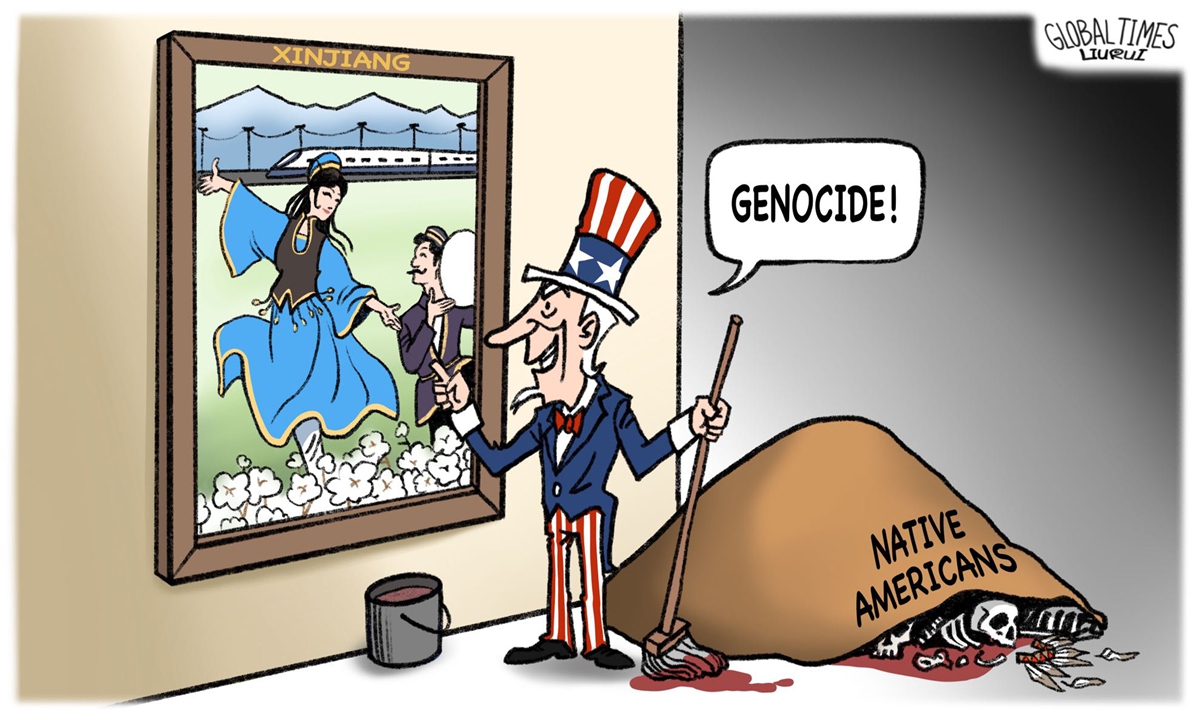
Xinjiang Illustration: Liu Rui/GT
The US recently released a strategy based on a bill on the nonexistent "forced labor" issue in China's Xinjiang Uygur Autonomous Region to reinforce its intention of destabilizing China's Xinjiang and containing China.
Analysts said the release of this strategy, led by the US security department, is another step in the US's tactics of playing politics and imposing economic restrictions to suppress China under the banner of "human rights." They warned that enforcing such a strategy would add huge uncertainties on bilateral trade and further tear apart political mutual trust.
China will take countermeasures to defend its own interests when necessary, analysts believe.
The Strategy to Prevent the Importation of Goods Mined, Produced, or Manufactured with Forced Labor in China was released by the US Department of Homeland Security on Friday, just days before the Uyghur Forced Labor Prevention Act is to come into force on Tuesday.
"Shipments imported on or after June 21 that are subject to the act will be processed under relevant procedures, and detained, excluded, or seized," the strategy said.
The 60-page strategy once again stages the US lie of the century - the "genocide" allegation against China's Xinjiang under the banner of "human rights." Consistent with the act, the strategy creates a "rebuttable presumption" that all goods partially or wholly produced in the Xinjiang region are "tainted by forced labor." It also requires corporations to prove with "clear and convincing evidence" that imports from the region are not made by forced labor.
Banning US companies that use goods sourced from Xinjiang in the supply chain from entering the US with the excuse of safeguarding "human rights" is de facto a restriction to Chinese companies, banning imports from China and improper suppression against key industries of China. Its actions severely infringe on international trade order, including the rules and principles of the World Trade Organization, Jia Chunyang, an expert at the China Institutes of Contemporary International Relations, told the Global Times on Sunday.
Zhao Lijian, a Chinese Foreign Ministry spokesperson, on June 2 said that if the Uyghur Forced Labor Prevention Act is implemented, it will seriously disrupt normal cooperation between Chinese and American businesses and undermine the stability of global supply chains, and will eventually hurt the US' own interests.
The
Uyghur Forced Labor Prevention Act has drawn controversy even within the US, as it results in an increase in the cost of trade for some American companies and has a broader impact on the global industrial chain. The US Senate and the House had several rounds of "battles" due to differences in each other's versions.
Apple, Nike and Coca-Cola were among the companies reportedly lobbying the US Congress to weaken the act, according to media reports.
If US President Joe Biden makes the decision to lift some tariffs on Chinese imports, what should be a warning is that US will instead attempt to restrict China's products and industries with non-tariff political tactics, Lü Xiang, a research fellow at the Chinese Academy of Social Sciences, told the Global Times. "In this case, it would result in huge uncertainties to bilateral trade and further weaken political mutual trust between China and the US."
The strategy lists several Chinese companies that mine, produce, or manufacture things with so-called forced labor and those working with the government in this regard, ranging from industries of electronic, polysilicon and silica-based products, computer parts, textiles and hair products.
Fabricating the lie of the so-called forced labor, the US wants to contain the development of China's Xinjiang region and China as a whole. For Xinjiang, its raw materials and solar panel industry have irreplaceable advantages in China and the global industrial chain, Lü said.
Zhao urged the US to refrain from enforcing the act and to stop using Xinjiang-related issues to interfere in China's internal affairs and contain China's development. If the US is bent on doing so, China will take forceful measures to firmly defend its own interests.
Lü believes that China should have sufficient determination and reason to counter the US, including imposing sanctions on the products of specific companies or states in response to the systematic human rights problems that are pervasive in the US.




